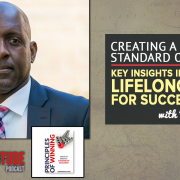Desmond Clark – Creating a Standard of Winning – Key Insights for Developing Lifelong Skills for Success (AoL 192)
As we’re getting started in this second year of potentially a two or three year pandemic “clean up” plan, there’s going to be plenty of time for us to really adjust and think about where we fit in the world. It’s a great time to develop our skills for success.
What do I mean by that?
Well, it’s a forced transition period for all of us. What might have been our identity in the past, might not work in the PAE.
That said, one group of individuals who all have to go through this major life change sometime in their career are professional athletes. Like our guest, Desmond “Dez” Clark says, if your identity was wrapped up into your job (as an athlete), you’re going to have issues when you can’t do that job anymore.
Luckily for Dez, he knew who he was before his career as a professional athlete. So when he finished up, yes, there was a transition period, but he was the same Dez who used the game as a means to get what he wanted.
In this chat with him, Ya’el and I learn a little bit of what he’s learned over the years through these transitions and how he’s been able to stay the course during his life using those experiences.
Enjoy!
SPECIFICALLY, YOU’LL FIND OUT MORE ABOUT:
- Where did Desmond’s early leadership mentality come from? 8:46
- How did he develop a vision for his athletic life and able to stick to it? 12:11
- When did Dez realize it was time to transition into a new life/identity? 17:07
- Why does he believe his success wasn’t a coincidence? 20:50
- How did Dez start realizing that failures aren’t necessarily endings but just learning opportunities no matter the cost? 25:00
- How does he actively build relationships to help him and those around him get to the next level? 28:11
- Is there a secret to gauging if a conversation is a winning conversation? 29:43
- What’s a bad day look like to Dez? 38:25
- What is he looking forward to in 2021? 41:06
- Which teachers have helped him get to where he’s at today? 42:53
- If he could ask anyone living a dead a question, who and what would he ask? 43:11
- Which issue should be discussed more today, yet hardly anyone does? 44:01
- What advice does he hear adults give children which he’d like to call BS on? 44:21
- What’s the secret to achieving personal freedom? 45:02
ITEMS and PEOPLE MENTIONED IN THIS EPISODE:
Desmond Online: Website, Facebook, LinkedIn, Twitter, Instagram
Cohost: Ya’el Johnson
Powered By: FREE GUIDE: Uncover Your Personal Mission
Right click here and save-as to download this episode to your computer.
SHOW NOTE EXTRAS:
Highlights from Dez’s NFL Career
Dez shares discusses his role as President of the NFL Alumni Chicago Chapter
Kevin Hicks interviews Dez
Tim Schumm interviews Dez
Thanks for Listening!
Thanks so much for joining us again this week. Have some feedback you’d like to share? Leave a note in the comment section below!
If you enjoyed this episode, please share it using the social media buttons you see at the top of the post.
Also, please leave an honest review for The AoL Podcast on iTunes! Ratings and reviews are extremely helpful and greatly appreciated! They do matter in the rankings of the show, and we read each and every one of them.
If you have any questions feel free to email them over via the email mentioned in the show or by our contact form.
And finally, don’t forget to subscribe to the show on Castbox, iTunes, Stitcher, PodBean, and/or Google Play Music. It’s absolutely free to do so.
A huge thank-you to you guys for joining us!
Cheers!




